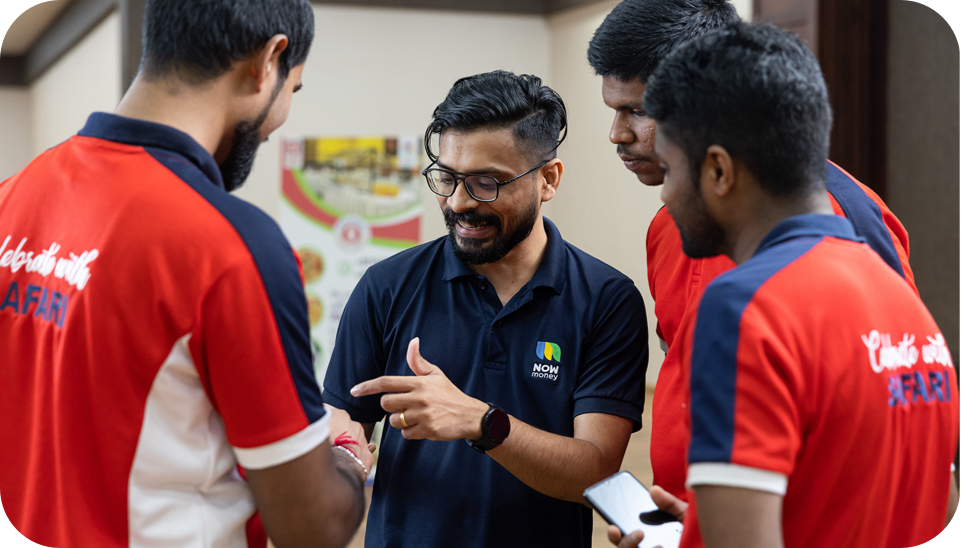Understanding the basics of financial literacy can help you make better decisions when managing your money.
Making better money decisions can support you in achieving your life goals such as saving for retirement, getting out of debt, owning your own home, or even starting your own business.
Having little or no financial literacy can make you more vulnerable to fraud, and more likely to accumulate unsustainable debts through poor money management – which can result in a poor credit rating, or more negative consequences such as repossession of your home.
It’s easy to see then, how financial literacy has a positive impact on our overall wellbeing, helping us to reduce the unnecessary anxiety that not feeling in control of our finances can have.
But the basics of financial literacy aren’t always taught to us as children and it’s not an inbuilt skill we have as humans, we all have to learn it. It is a lifelong journey for everyone and has no relationship to how much you earn or how much savings you have.
So what is financial literacy? And how can we improve our own?
The term financial literacy refers to the understanding and effective use of a number of different financial skills and concepts such as managing your money using digital tools and products, budgeting, saving, borrowing, managing debt and investing.
The 3 fundamental skills we’ll cover in this blog are:
- Budgeting
- Saving
- Managing debt
Financial literacy can be improved by reading guides and blogs, listening to podcasts or attending education sessions that your employer or financial institution may offer.
We hope this blog will help you get started, or continue, your financial literacy journey.
Budgeting
What is a budget?
A personal budget is a spending plan that takes into account your income and your expenses for a defined period of time, usually one month. Having a budget helps you understand and prioritise your most important bills and spending – such as rent and food – and what you have leftover for saving or other spending.
In fact, the purpose of budgeting is so that you know what you have to spend to help you avoid overspending and getting into debt, so that you can focus on saving towards your goals.
It doesn’t matter whether you use an excel spreadsheet or write your budget on paper – it just matters that you accurately track your income and outgoings. You are in control of your budget, it doesn’t control you. You assign your money to specific outgoings – so think of it as a guide to make sure your money does what you have told it to do. This gives you a sense of being in control of your money.
Creating your budget
Start by putting down your income, the salary you receive from your work and any other money you have coming into you, and then your expenses or outgoings, where you spend or send your money.
It is helpful to go back through your bank transactions for the last few months if you can, or write down every bill you pay or purchase you make – even just a coffee, you’ll see it all adds up.
Tracking your spend this way can help you accurately identify your future monthly outgoings: but you should also consider less regular payments and one off costs.
Consider the following expenses:
- Housing
- Utilities
- Food
- Transport
- Debt & Insurance
- Phone
- Money for family
- Extras: Clothes, Entertainment, Travel, Gifts
- Unplanned bills: Car repairs, medical bills
Budget experts commonly divide expenses into two categories: needs and wants. Needs are those things that are essential to your daily life (housing, food, transport, etc.) while wants are things that improve the quality of life but are not essential to life itself (beauty products, eating out, etc.).
There is a global cost of living crisis, and many old budgeting systems don’t work for many of us, for example the 50/30/20 rule.
According to this popular budgeting system, you should commit 50% of your income to your needs, 30% to your wants and 20% to your savings or debt repayment.
This budget rule may not work for all of us, but the principle can apply to everyone. Start with your basic living expenses – what % of your income does this come to? If it’s 50% of less, then great. But for many it could be more like 70%. Decide what you would like to save, or what you need to pay down your debt. Then the rest is what can be allocated to your savings goals.
If you find that you are overspending – that you outgoings are greater than your income, you are best to try cutting down on unnecessary expenses and save money where you can – read the UAE Ministry of Finance’s Top Tips to Save Money in the UAE.
Remember, budget preparation does not need to be complicated. You can use a pen and paper, excel spreadsheet, Google Sheets, or download a budgeting app from your Google or Apple play store. You control it, it doesn’t control you!
Saving
Budgeting is important because you need it to save money. Only when you are spending less than you earn can you start to do that.
Why is saving money important?
But why do you need to save money? What’s the point of denying yourself so you can spend less than you earn?
Well, you need to save money to achieve expensive financial goals. For example, if you hope to retire one day, then you need to save to live comfortably with enough cash flow without having to work. Similarly, if you wish to buy a property in the future, you will need to save enough money to at least make a down payment on the property.
Whatever financial goals you have for the future – sending your kids to school abroad, starting a business, etc. – you need to save money in the present to achieve them.
In addition, we all should aim to have an emergency fund of readily accessible savings in case of an emergency – such as job loss or unexpected repair bill.
Save before you spend
Since George Clason’s The Richest Man in Babylon became popular, financial coaches and advisors have continued to recommend one of his nuggets of financial advice: save before you spend.
To avoid overspending, it is better to first secure the portion of your income you want to save and put it somewhere safe (more on this later). Left with only the portion you have allocated to needs and wants, you cannot be tempted to overspend without going into debt.
Saving consistently
The most important thing about saving money is doing it consistently.
Anyone can save money occasionally, but those who want to build wealth and achieve their financial goals are committed to doing it consistently (that is, every month).
Debt management
Another reason why you need to spend less than you earn is to avoid debt.
Debt can occur when you’re not fully on top of your expenses and haven’t planned your spend accordingly. Good news, if you’ve read above, you know that creating a budget will help you forecast most spend and help you control spending.
But it is important to know that overspending doesn’t mean you have no self-control.
You may have an unexpected expense – such as a medical emergency car accident – and you may be forced to turn to credit cards or loans to pay.
Getting into debt is expensive. You will have to pay interest on the amount you borrowed, and any delay in repayment may mean even higher interest rates.
As more of your income goes into debt repayment, a cycle is started and the debt can mount up causing you money worries.
Avoiding debt with emergency funds
There are times for all of us, when emergencies (unplanned expenses) arise and you have to spend money to meet them.
Being financially literate means that you understand the importance of having an emergency fund to cover these expenses. Your fund should be an instant access, revolving account – that is, you can withdraw your funds instantly and then top it back up when you can.
An emergency fund should ideally contain three to six months’ worth of your living expenses (needs plus wants). So, if your living expenses are AED 1,000 per month, you will need an emergency fund of AED 3,000 to AED 6,000.
Tackling debt with the debt snowballing method
Don’t panic if you are already in debt. Almost half of workers in the UAE have some form of debt.
There are concepts you can apply to help you get out of debt like the debt snowballing system advises;
- Step 1: List your debts from smallest to largest regardless of interest rate.
- Step 2: Make minimum payments on all your debts except the smallest.
- Step 3: Pay as much as possible on your smallest debt.
- Step 4: Repeat until each debt is paid in full.
Do you prioritize paying off your debt or saving towards your emergency fund?
Financial advisors suggest that you first partially build your emergency fund (with up to three months’ worth of your living expenses, for example) before embarking on the debt snowballing system. After paying off your debt, you can then completely build your emergency fund.
The goal here is to ensure that you are prepared to meet any emergencies that might arise while you are dealing with your debt. Without an emergency fund, you might be forced to take on more debt while repaying old ones.
Conclusion
Knowledge is power. Know exactly what your living expenses are can help you make good money decisions such as how much you can save and what you can spend on wants every month.
Through creating and sticking to a budget, prioritising saving and managing your debt – you can improve your financial wellbeing and look forward to achieving your goals in the future.







